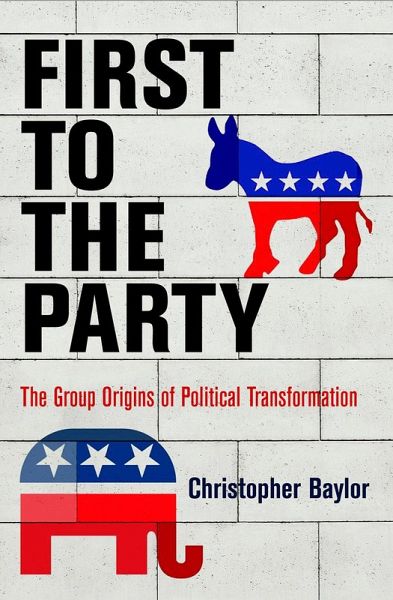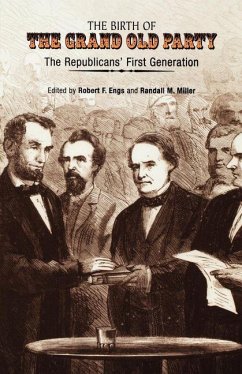
First to the Party (eBook, ePUB)
The Group Origins of Political Transformation
Versandkostenfrei!
Sofort per Download lieferbar
62,95 €
inkl. MwSt.
Weitere Ausgaben:

PAYBACK Punkte
31 °P sammeln!
The United States has scores of potential issues and ideologies but only two major political parties. How parties respond to competing demands for their attention is therefore central to American democracy. First to the Party argues that organized groups set party agendas by invading party nominations to support candidates committed to their interests. Where the nominees then go, the parties also go.Using in-depth archival research and interviews with activists, Christopher Baylor applies this proposition to the two most important party transformations of the twentieth century: the Democratic ...
The United States has scores of potential issues and ideologies but only two major political parties. How parties respond to competing demands for their attention is therefore central to American democracy. First to the Party argues that organized groups set party agendas by invading party nominations to support candidates committed to their interests. Where the nominees then go, the parties also go.
Using in-depth archival research and interviews with activists, Christopher Baylor applies this proposition to the two most important party transformations of the twentieth century: the Democratic Party's embrace of civil rights in the 1940s and 50s, and the Republican Party's embrace of cultural conservatism in the 1980s. The choices made by the parties in these circumstances were less a response to candidates or general electoral pressures than to activist and group influences on nominations. Party change is ultimately rooted in group change, which in turn is ultimately rooted in the coalitional and organizational challenges confronting groups. Baylor surveys the factors that determine whether a coalition is viable, including issue overlap, the approval of their own members and staff, and the ability to reach new audiences. Whether groups succeed in transforming parties depends largely on choosing the right allies and adjusting accordingly.
In moments of profound party change, the prevailing political forces come to light. With its fine-grained analysis of major party change, First to the Party offers new insight into the classic issues confronting parties, representation, and democracy.
Using in-depth archival research and interviews with activists, Christopher Baylor applies this proposition to the two most important party transformations of the twentieth century: the Democratic Party's embrace of civil rights in the 1940s and 50s, and the Republican Party's embrace of cultural conservatism in the 1980s. The choices made by the parties in these circumstances were less a response to candidates or general electoral pressures than to activist and group influences on nominations. Party change is ultimately rooted in group change, which in turn is ultimately rooted in the coalitional and organizational challenges confronting groups. Baylor surveys the factors that determine whether a coalition is viable, including issue overlap, the approval of their own members and staff, and the ability to reach new audiences. Whether groups succeed in transforming parties depends largely on choosing the right allies and adjusting accordingly.
In moments of profound party change, the prevailing political forces come to light. With its fine-grained analysis of major party change, First to the Party offers new insight into the classic issues confronting parties, representation, and democracy.
Dieser Download kann aus rechtlichen Gründen nur mit Rechnungsadresse in A, D ausgeliefert werden.













